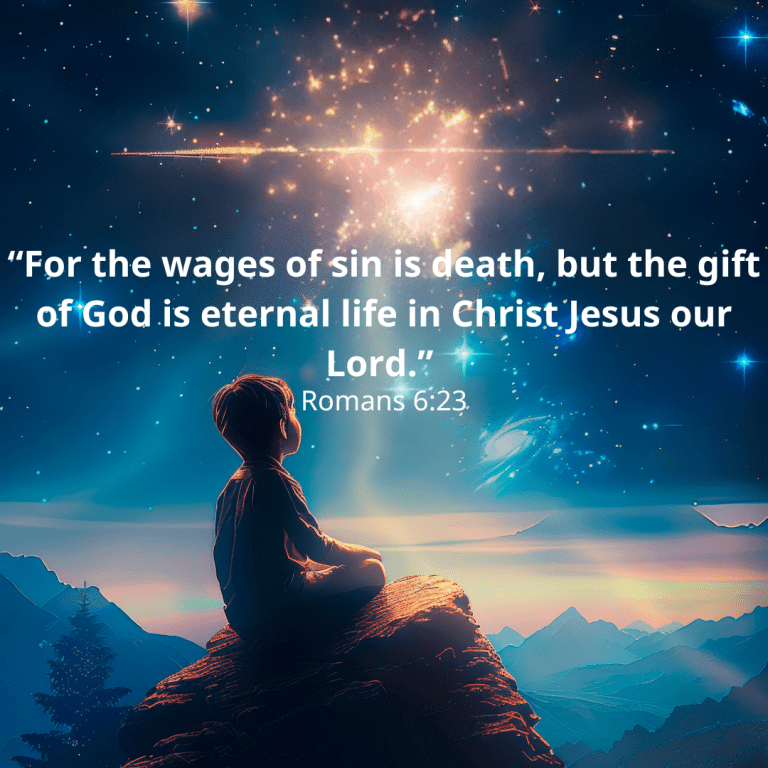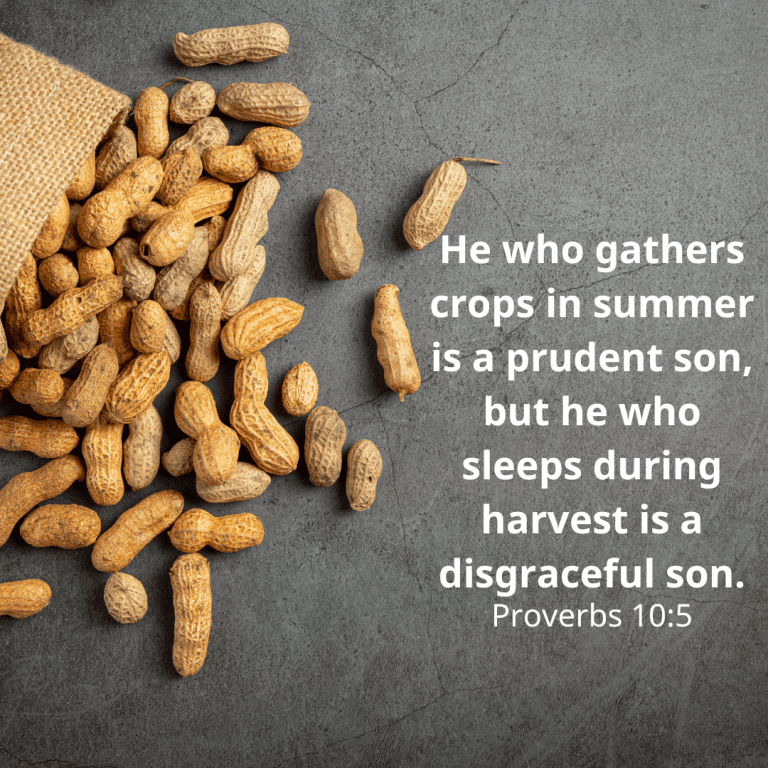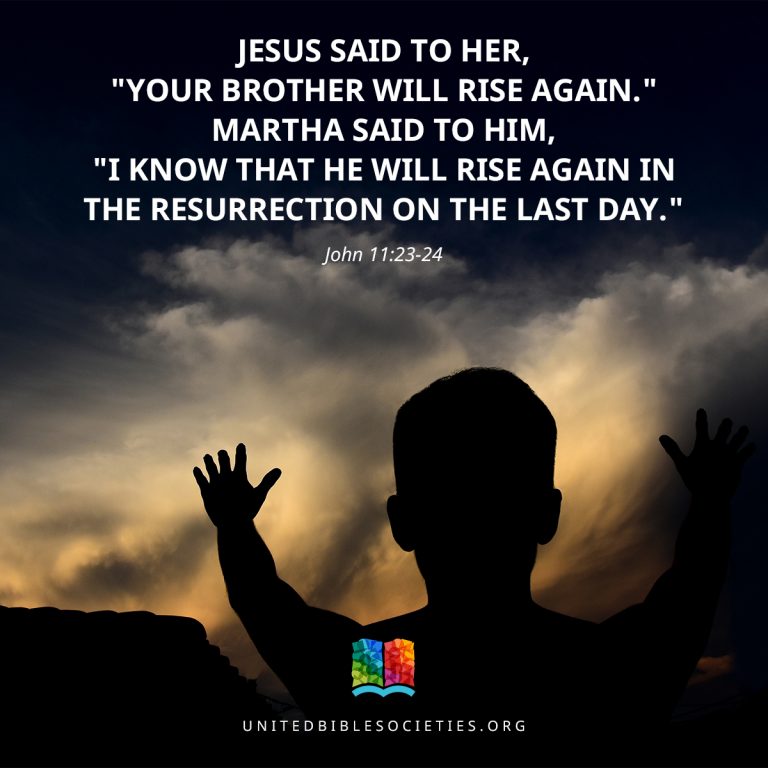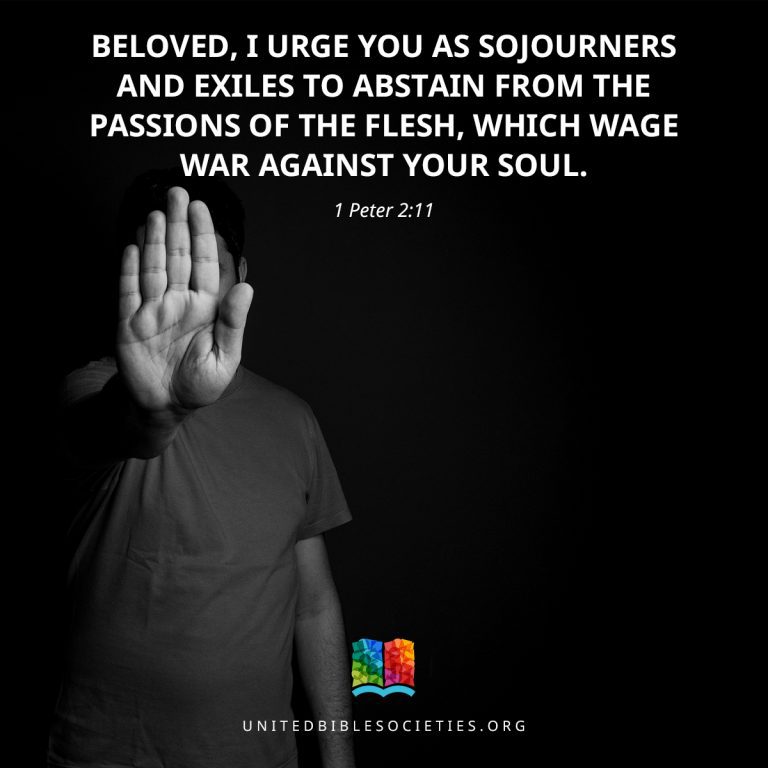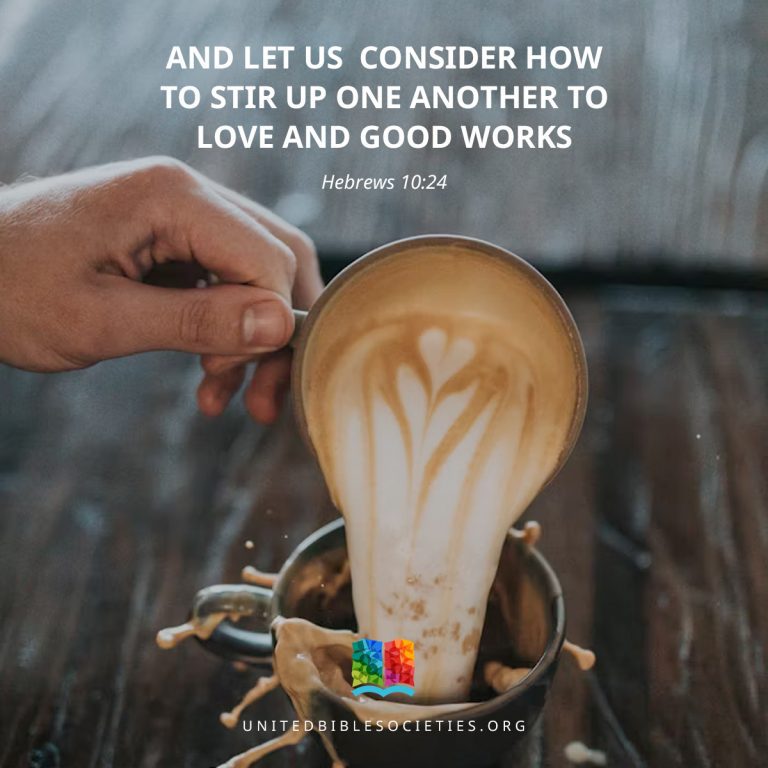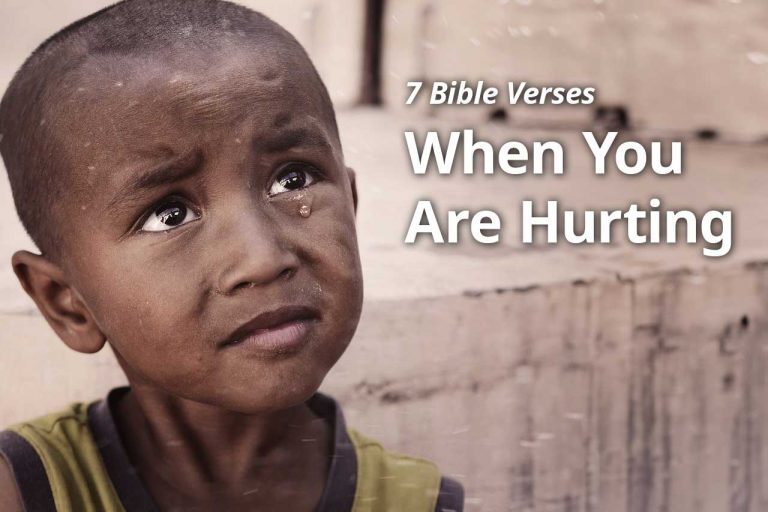Jesus Feeds Five Thousand
(Matthew 14.13-21Mark 6.30-44Luke 9.10-17)1 After this, Jesus went across Lake Galilee (or, Lake Tiberias, as it is also called). 2 A large crowd followed him, because they had seen his miracles of healing the sick. 3 Jesus went up a hill and sat down with his disciples. 4 The time for the Passover Festival was near. 5 Jesus looked around and saw that a large crowd was coming to him, so he asked Philip, “Where can we buy enough food to feed all these people?” ( 6 He said this to test Philip; actually he already knew what he would do.)
7 Philip answered, “For everyone to have even a little, it would take more than two hundred silver coins to buy enough bread.”
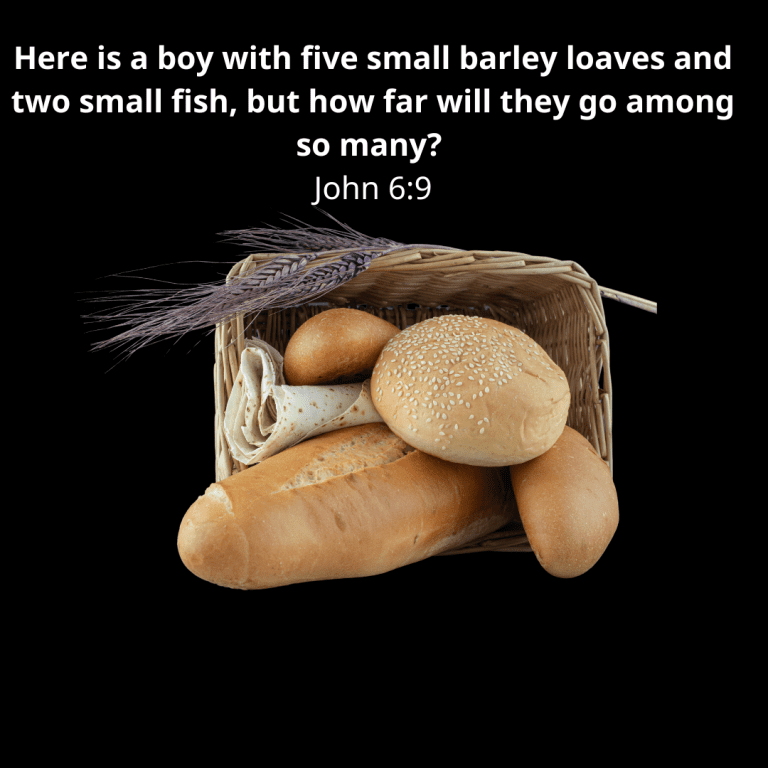
8 Another one of his disciples, Andrew, who was Simon Peter's brother, said, 9 “There is a boy here who has five loaves of barley bread and two fish. But they will certainly not be enough for all these people.”
10 “Make the people sit down,” Jesus told them. (There was a lot of grass there.) So all the people sat down; there were about five thousand men. 11 Jesus took the bread, gave thanks to God, and distributed it to the people who were sitting there. He did the same with the fish, and they all had as much as they wanted. 12 When they were all full, he said to his disciples, “Gather the pieces left over; let us not waste a bit.” 13 So they gathered them all and filled twelve baskets with the pieces left over from the five barley loaves which the people had eaten.
14 Seeing this miracle that Jesus had performed, the people there said, “Surely this is the Prophet who was to come into the world!” 15 Jesus knew that they were about to come and seize him in order to make him king by force; so he went off again to the hills by himself.
Jesus Walks on the Water
(Matthew 14.22-33Mark 6.45-52)16 When evening came, Jesus' disciples went down to the lake, 17 got into a boat, and went back across the lake toward Capernaum. Night came on, and Jesus still had not come to them. 18 By then a strong wind was blowing and stirring up the water. 19 The disciples had rowed about three or four miles when they saw Jesus walking on the water, coming near the boat, and they were terrified. 20 “Don't be afraid,” Jesus told them, “it is I!” 21 Then they willingly took him into the boat, and immediately the boat reached land at the place they were heading for.
The People Seek Jesus
22 Next day the crowd which had stayed on the other side of the lake realized that there had been only one boat there. They knew that Jesus had not gone in it with his disciples, but that they had left without him. 23 Other boats, which were from Tiberias, came to shore near the place where the crowd had eaten the bread after the Lord had given thanks. 24 When the crowd saw that Jesus was not there, nor his disciples, they got into those boats and went to Capernaum, looking for him.
Jesus the Bread of Life
25 When the people found Jesus on the other side of the lake, they said to him, “Teacher, when did you get here?”
26 Jesus answered, “I am telling you the truth: you are looking for me because you ate the bread and had all you wanted, not because you understood my miracles. 27 Do not work for food that spoils; instead, work for the food that lasts for eternal life. This is the food which the Son of Man will give you, because God, the Father, has put his mark of approval on him.”
28 So they asked him, “What can we do in order to do what God wants us to do?”
29 Jesus answered, “What God wants you to do is to believe in the one he sent.”
30 They replied, “What miracle will you perform so that we may see it and believe you? What will you do? 31 Our ancestors ate manna in the desert, just as the scripture says, ‘He gave them bread from heaven to eat.’”
32 “I am telling you the truth,” Jesus said. “What Moses gave you was not the bread from heaven; it is my Father who gives you the real bread from heaven. 33 For the bread that God gives is he who comes down from heaven and gives life to the world.”
34 “Sir,” they asked him, “give us this bread always.”
35 “I am the bread of life,” Jesus told them. “Those who come to me will never be hungry; those who believe in me will never be thirsty. 36 Now, I told you that you have seen me but will not believe. 37 Everyone whom my Father gives me will come to me. I will never turn away anyone who comes to me, 38 because I have come down from heaven to do not my own will but the will of him who sent me. 39 And it is the will of him who sent me that I should not lose any of all those he has given me, but that I should raise them all to life on the last day. 40 For what my Father wants is that all who see the Son and believe in him should have eternal life. And I will raise them to life on the last day.”
41 The people started grumbling about him, because he said, “I am the bread that came down from heaven.” 42 So they said, “This man is Jesus son of Joseph, isn't he? We know his father and mother. How, then, does he now say he came down from heaven?”
43 Jesus answered, “Stop grumbling among yourselves. 44 People cannot come to me unless the Father who sent me draws them to me; and I will raise them to life on the last day. 45 The prophets wrote, ‘Everyone will be taught by God.’ Anyone who hears the Father and learns from him comes to me. 46 This does not mean that anyone has seen the Father; he who is from God is the only one who has seen the Father. 47 I am telling you the truth: he who believes has eternal life. 48 I am the bread of life. 49 Your ancestors ate manna in the desert, but they died. 50 But the bread that comes down from heaven is of such a kind that whoever eats it will not die. 51 I am the living bread that came down from heaven. If you eat this bread, you will live forever. The bread that I will give you is my flesh, which I give so that the world may live.”
52 This started an angry argument among them. “How can this man give us his flesh to eat?” they asked.
53 Jesus said to them, “I am telling you the truth: if you do not eat the flesh of the Son of Man and drink his blood, you will not have life in yourselves. 54 Those who eat my flesh and drink my blood have eternal life, and I will raise them to life on the last day. 55 For my flesh is the real food; my blood is the real drink. 56 Those who eat my flesh and drink my blood live in me, and I live in them. 57 The living Father sent me, and because of him I live also. In the same way whoever eats me will live because of me. 58 This, then, is the bread that came down from heaven; it is not like the bread that your ancestors ate, but then later died. Those who eat this bread will live forever.”
59 Jesus said this as he taught in the synagogue in Capernaum.
The Words of Eternal Life
60 Many of his followers heard this and said, “This teaching is too hard. Who can listen to it?”
61 Without being told, Jesus knew that they were grumbling about this, so he said to them, “Does this make you want to give up? 62 Suppose, then, that you should see the Son of Man go back up to the place where he was before? 63 What gives life is God's Spirit; human power is of no use at all. The words I have spoken to you bring God's life-giving Spirit. 64 Yet some of you do not believe.” (Jesus knew from the very beginning who were the ones that would not believe and which one would betray him.) 65 And he added, “This is the very reason I told you that no people can come to me unless the Father makes it possible for them to do so.”
66 Because of this, many of Jesus' followers turned back and would not go with him any more. 67 So he asked the twelve disciples, “And you—would you also like to leave?”
68 Simon Peter answered him, “Lord, to whom would we go? You have the words that give eternal life. 69 And now we believe and know that you are the Holy One who has come from God.”
70 Jesus replied, “I chose the twelve of you, didn't I? Yet one of you is a devil!” 71 He was talking about Judas, the son of Simon Iscariot. For Judas, even though he was one of the twelve disciples, was going to betray him.
aza 6
Yecu kwubiye lizi lir alaaf ṯuḏni
1 kwaḏan ta, na Yecu duŋgwaḏa tujul ṯi-na teni jaliil, teḏi tabariiyaŋw, 2 na ŋwuduŋw kwaḏiḏa ŋwuru, kaka mer gwu inḏaci ŋilima ŋerricaŋw zi luma. 3 na Yecu allu kayin la, ner gwu nanalu limeḏgen li. 4 na kuruu keni titamḏa ŋiɽany adiḏi, iid yi weḏi yahuuḏ. 5 ŋwu taŋwu, na Yecu dimi yey, nuŋw eze ŋwuduŋw ŋwitezir ŋwulubeḏu nana, ŋwinḏi nanuŋw gwu; nuŋw eca fiilibbuzŋw ŋwu: ler zi lica klu eḏneya ṯaka, wir ye? 6 nuŋw zi andaci ŋu, tecaŋw gwu, kaka ilŋiicaŋw gwu ŋundu rac kweŋguŋw erri. 7 na fiilibbuz eŋnici, nuŋw eca ŋwu: mer kinna iila eḏneya jineya wri, mer ye lere lere wɔkwɔ wɔkwɔ domony, ŋwuzi ta ere biɽdi too. 8 nuŋw eŋnici kwete kwirir limeḏgen li kweni andaraawuz, kwirir zimaan buṯruz gi ŋiaŋga, nuŋw eca ŋwu: 9 tor tete tinani kunuŋ tapa eḏneya wir yafaŋi ṯuḏni, na lum nden lɔkwɽeny; lakin kweni ŋgwu aḏa, kaka temḏir gwu lu litezir? 10 nezi Yecu eca ŋwu: owḏer lizi lu, er nanalu, ezir wata weḏi karwa kitezir, na lizi linanalu lir lor liri kaka alaaf ṯuḏni. 11 taŋwu na Yecu dimi eḏneya; nuŋw ortaḏa, nuŋw zi kannaci kla lowḏelu, lum li tɔk, kaka naŋnar gwu. 12 mer be eḏneya, nuŋw eca limeḏgen ŋwu: aɽizar wa weɽne duŋw, mindaŋ eḏere kiraḏa lu were mac. 13 ner aɽazi duŋw, ner urezi luffa wri-kwuɽen eḏne yi wuṯayinelu.
14 ma lizi klu eze ŋilima ŋerrizi Yecu, ner ari: kwunderṯa ŋgwu rac kwir kwiɽi, kwinḏi eḏila ki ṯurmun-na. 15 na mezi Yecu inḏa kwumer naŋni eḏele eḏi miḏa, eḏi ruzi melik ŋuma ŋi-na, nuŋw duŋgwaḏa kwokwony, nuŋw allu kayin la kwutuput.
Yecu kwinḏi kwutuput eḏari ki yiriny, nuŋw ele ŋaw la
16 ma kirakalu orɔ nyɔnɔ-nyɔnoc, na limeḏgen oɽi ki ṯujul-na. 17 mindaŋ mer enḏi ki faluuka-na, ner gi ele ŋaw la eḏilaḏa kafranahum ŋgi. nezi ezir riimeḏa, na Yecu ere ila nanir gwu kinna mac. 18 na ŋaw upuḏuna, kaka upu gwu kurun kuru tu-tu. 19 mer ṯa iili faluuka ki ṯujul-na keligeny-na, ner eze Yecuŋw kwinḏi ŋaw la, mindaŋ muŋw ilizi faluuka, ner ṯenye. 20 nuŋw zi eca ŋwu: nyi kwiri. eṯi ṯinya mac. 21 ṯa ner ta enji ki faluuka-na, lamina; na faluuka upaḏi tuc ezir wilaḏir gwu.
lizi linaŋna ŋilima
22 ma ŋurpu ŋgwa orɔ, na ŋwuduŋw nani ṯujuli kəni kinaŋw gwu ŋgwena, ŋwumeze faluuka kwutuput dak, ner elŋece eḏaru ŋwa, Yecu kwiti kwumenji ki faluuka-na limeḏgen li mac, lakin na limeḏgen ele cukcuk. 23 lakin na lifaluuka, linḏi ṯabariiya ŋgi, ila ezir kworɔ wiiḏinar gwu eḏneya wortaḏa Kweleny. 24 ŋwu ṯa, na ŋwuduŋw ulezi Yecuŋwuzi limeḏgen li, ner enḏi ŋunduŋa tɔk ki lifaluuka-na, ner ele kafranahum, linaŋna Yecuŋw.
eḏne weṯinḏeḏa ŋimiiḏa
25 mer inḏa ṯujuli kəni kinaŋw gwu ŋgwena ner eca ŋwu: rabbi, a kwumila ṯacaŋ? 26 nezi Yecu eŋnici, nuŋw zi eca ŋwu: nyi kwecaŋazi ma ŋwa rerem, a linaŋna nyuŋwu kaka ma gwu be eḏne yi wiiḏi ŋa. a lende limila ŋiɽaŋal ŋi ŋeḏi ŋilim ŋizaŋazi. 27 eṯəkina mac eḏne yi ŋɔḏɽor weṯidigɽi, lakin eṯi yi əkini ŋɔḏɽor wetinanniḏa wizaw, eḏinḏeḏa ŋimiiḏa ŋiaŋ, ŋinḏi eḏi nanniḏa dɔk, winḏi ŋazi Tor teḏi kwizigwunaŋ eḏinḏeḏa. tinderṯa timɔ gwu Papa kweni Allah inḏeḏa zulṯa kwuŋwun. 28 ner eca ŋwu: ta enyi ma ari ḏa, eḏi ma erri ŋɔḏɽor ŋeḏi Allah? 29 nezi Yecu eŋnici, nuŋw zi eca ŋwu: ŋinderṯa ŋeni ŋɔḏɽor ŋeḏi Allah, eḏalliḏa ŋgwa kwuzaŋw ṯugwori nana. 30 ṯaŋwu, ner eca ŋwu: ŋilim ŋinder ŋendu ŋenyji errici, eḏi zi eze, eḏi ma emnizi ŋaŋwu. a kweṯerri aḏa? 31 eṯi papaŋa leri ye eḏneya weni manna kwuḏer-na, kaka luḏinar gwu, ŋaruŋw: linḏeḏaŋw zi eḏneya woɽi kilerena eḏi ye. 32 nezi Yecu eca ŋwu: nyi kwecaŋazi ma ŋwa rerem, muuza kwiti kwiri mac kwinḏeḏa ŋazi eḏneya woɽi kilerena; lakin Papa kwinyi kwiri ŋgwu kwinḏeḏa ŋazi eḏneya wir rerem woɽu kilerena. 33 na eḏne weḏi Allah, winderṯa woɽu kilerena, eḏi zi inḏeḏa leḏi ṯurmun ŋimiiḏa. 34 ner eca ŋwu: Kweleny etinyjinḏeṯa ṯi eḏneya wu dɔk dɔk.
35 nezi Yecu eca ŋwu: nyi kwiri pa kwir eḏne weṯinḏeḏa ŋimiiḏa; muŋw ila kwere nani nyi gwu, a yaŋwu ere ye mac, na kwere kweṯinyi emni eḏalliḏa ṯugwori nana, a owḏa ere ye kwokwony mac. 36 lakin ŋaŋa, kaka ari nyi gwu, a liti lemni mac, keni limenyeze. 37 kla tatap leṯinyji Papa inḏeḏa, er ila nani nyi gwu, na ŋgwa kwila nani nyi gwu, e nyi ere ṯiŋaḏalu ḏuṯ, 38 kaka oɽi nyi gwu kilerena, eḏi zi ere erri ŋeḏi ṯugwor ṯinyi mac, lakin eḏi zi erri ŋeḏi ṯugwor ṯeḏi ŋgwa kwuzanyi. 39 ŋeḏi ṯugwor ṯeḏi ŋgwa kwuzanyi ŋir ŋu, eḏi nyi ere ṯuzi keni kwere mac kweḏi kla tatap limɔŋw zi inḏeḏa nyuŋwu, lakin eḏi nyi diɽi ŋunduŋwuzi ki lamin leḏi kwaḏanŋw. 40 ŋinderṯa ŋu ŋiri ŋeḏi ṯugwor ṯeḏi Papa kwinyi, eḏi kwere nyiḏak kweṯeze Tiɽŋeyin, na kweṯalliḏa ŋunduŋwu ṯugwori nana, eḏi ŋimiiḏa ŋiaŋ ŋinḏi eḏi nanniḏa dɔk, kwenyi diɽi ki lamin leḏi kwaḏanŋw.
41 na yahuuḏ ermiḏeḏa nana kaka aruŋw gwu ŋwu: nyi kwiri eḏne woɽu kilerena. 42 ner aru ŋwu: kwunde kwiti kwiri ŋgwu manya kweni Yecu, kwir tor teḏi yuzif a? a kwilŋiiḏir pa ṯernyin ŋwuzi lenyin gi rac, na aḏa kwiri mindaŋ aruŋw ŋwu: nyi kwumoɽa kilerena? 43 nezi ṯa Yecu eŋnici, nuŋw zi eca ŋwu: eṯermiḏeḏir-na ŋwu mac. 44 kwizi kwiti kwere mac kweḏi ŋuma eḏila nani nyi gwu, illa ŋgwa kwumulcanyi Papa kwuzanyi, na kwenyi diɽi ki lamin leḏi kwaḏanŋw. 45 ŋuluḏizi liɽi, ner ari, lezi Allah ilŋiiḏini tatap, roḏur ŋwu, kwizi kwere nyiḏak kwumɔneŋne Papaŋw, kwumezelŋece ŋeni ŋuŋun, kwunderṯa kweṯila nani nyi gwu. 46 kwiti kwere kwiza Papaŋw mac, illa ŋgwa kwinḏi nani gwu Allah, kwunderṯa kwumeze Papaŋw. 47 nyi kwecaŋazi ma ŋwa rerem, kwere kweṯalliḏa nyuŋwu ṯugwori nana, kwunderṯa kweḏi ŋimiiḏa ŋiaŋ ŋinḏi eḏi nanniḏa dɔk.
48 nyi kwiri ṯa ŋgwu kwir eḏne weṯinḏeḏa ŋimiiḏa. 49 rarnyalu riiḏi manna kwuder-na, ner keni ay. 50 winderṯa wu wir eḏne woɽu kilerena, mindaŋ ma kwere ye ta, ŋwere ay mac. 51 nyi kwiri ṯa ŋgwu kwir eḏne weṯinḏeḏa ŋimiiḏa, woṯu kilerena, muŋw ye kwere eḏneya wu, ŋwunanniḏa kwumiiḏu dɔkdɔk. na eḏne wenyji yi inḏeḏa kla leḏi ṯurmun ŋimiiḏa, aŋna winyi wiri.
52 ta na yahuuḏ upaḏa lu deŋgen-na, ner ari: kwor ŋgwu kwenyjinḏeḏa aŋna wuŋwun aŋgwuru, eḏi ye? 53 ŋwu ṯa, nezi Yecu eca ŋwu: nyi kwecaŋazi ma ŋwa rerem, ma ere ye aŋna weḏi Tor teḏi kwizigwunaŋ mac, ma ere ii ŋina ŋuŋun tɔk mac, a liti leḏi ŋimiiḏa daŋgal-na mac. 54 kwere kweṯi ye aŋna winyi, kweṯ ii ŋina ŋinyi tɔk, kwunderṯa kweṯeḏi ŋimiiḏa-na ŋiaŋ, ŋinḏi eḏi nanniḏa dɔk, e nyi diɽi ŋunduŋwu ki lamin leḏi kwaḏanŋw. 55 kaka urgwu aŋna winyi eḏne rerem, na ŋin ŋinyi orɔ tiiḏa rerem tɔk. 56 kwere kweṯi ye aŋna winyi, na kweṯ ii ŋina ŋinyi tɔk, kwunderṯa kweṯinani duŋgwinyi-na, eṯi nyi gwu nani-na tɔk. 57 kaka uzanyi gwu Papa kwumiiḏu, na miiḏi nyi gwu Papa ŋgi, ŋwu ṯa, ŋgwa kweṯi nyi ṯa ye, ŋwumiiḏi duŋgwinyi ŋgi tɔk. 58 winderṯa wir eḏne woɽu kilerena; witi wir kaka wa wiiḏi rarnyalu-ŋa mac, ner ay; kweṯi ye eḏneya wu, ŋwunanniḏa kwumiiḏu dɔk dɔk. 59 nuŋw zi andazi ŋiɽaŋali ŋu ki majma-na kwete, ilŋiiḏinaŋw zi gwu kafranahum.
lizi liti leḏi ṯəmna mac mer orlaci Yecuŋw ŋwudɔŋw
60 na luru limɔkwaḏiḏa ŋunduŋwu, mer zi ṯa neŋne, ner ari: ŋiɽaŋal ŋu ŋifirlaṯinyji. eya kwunaŋna eḏi zi neŋne? 61 nezi Yecu elŋece ki ṯugwor-na ŋeḏi kla limɔkwaḏiḏa, ŋimer ŋi ərum, nuŋw zi eca ŋwu: ŋimɔŋazi ṯugwudazi eḏi zi aki pir a? 62 a leḏi rɔtɔ ḏa, ma gwu eze Toru teḏi kwizigwunaŋ elliḏuŋw gwu kezir wunanuŋw gwu kerreny? 63 ṯigɽim tiri, ṯeṯinḏeḏa ŋimiiḏa. aŋna ta, eṯuŋw ene luŋw. ŋiɽaŋal ŋimɔ ŋazi andaci eṯir orɔ ṯigɽim na ŋimiiḏa tɔk. 64 na kla lɔkwɔ daŋgal-na liti leḏi ṯəmna mac. kaka ilŋiica zi gwu Yecu kwizatuk kla liti leḏi ṯəmna mac; nuŋw elŋece ŋgwa tɔk kwinḏi eḏi bɔŋwḏi. 65 ŋwu ta, nuŋw zi eca ŋwu: roḏur ŋwu, nyi kwumɔ ŋazi eca ŋwu, kwizi kwiti kwere mac kweḏi ŋuma eḏila nani nyi gwu, illa ŋgwa kwumɔ Papa inḏeḏa ŋuma eḏila.
ṯundiza ki ṯiŋna teḏi buṯruz, aruŋw: Yecu kwiri Kwruztu
66 ki lomur ṯa kla na luru limɔkwaḏiḏa duŋgwaḏa, ner li ere romḏi kwokwony mac. 67 ta nezi Yecu eca wri-kwuɽen ŋwu: a linaŋna eḏi duŋgweci nyuŋwu tɔk a? 68 na zimaan buṯruz eŋnici, nuŋw eca ŋwu: Kweleny, ta enyi ma ele nani gwu eya? ŋiɽaŋal ŋɔŋa ŋeṯinḏeḏa ŋimiiḏa ŋiaŋ, ŋinḏi eḏi nanniḏa dɔk. 69 nyiŋa leḏi ṯəmna, na ŋimenyji elŋece eḏaruŋw: a kwiri Kwirlinelu ter kweḏi Allah. 70 nezi Yecu eŋnici, nuŋw zi eca ŋwu: nyi kwiti kwicaŋazi-na wri-kwuɽen manya, na ŋgwu kwete keni daŋgal-na kwir ibliiz? 71 nuŋw zi andazi ŋeḏi yahuuza kwir tor teḏi zimaan izkaryuuṯi, kaka urŋw gwu kwinḏi eḏi bɔŋwḏi, kwir kweḏi kla lirir li wri-kwuɽen.

